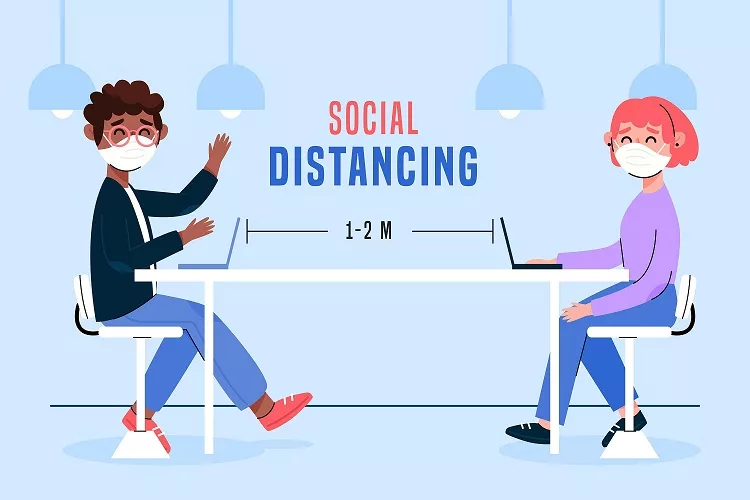
More public places are requiring the use of face masks to avoid the spread of a virus-based illness. In Dubai, wearing a face mask is an extra precaution to prevent the transmission of virus-carrying droplets. Wearing a mask is an extra step in limiting the spread of virus-carrying droplets.
You’ve heard it before, and you know wearing a face mask Dubai is an extra step in preventing the spread of virus-carrying droplets. Use a mask and wash your hands often when you can’t physically remove yourself from others to protect your community and our most vulnerable.
Why Is It Important To Wear A Mask?
You can wear a mask for a variety of purposes. It is advantageous while also enhancing your style statement. Here are some reasons for you to believe why it is necessary to wear a mask.
Masks Can Prevent You from Touching Your Face
We tend to touch our face often, and we don’t even realise doing it. We restrict direct contact with our nose and mouth in public areas by wearing a corporate mask, a typical way for viruses to spread. We can assist prevent sickness transmission by adopting good hand hygiene habits and washing our hands before and after mask use.
Masks Can Help To Physically Distance
The sheer presence of masks in congested areas acts as a reminder to maintain a safe distance. Even when both of you wear masks, the visual helps us remain aware of our surroundings and maintain our isolation from those outside our bubble, even when physical separation is difficult.
They reduce viral transmission
Everyone may reduce virus transmission by 70% if they use surgical masks and cloth covers appropriately over their nose and mouth. Before you apply your face mask UAE, make sure you cleanse your hands. Make sure it covers your nose and mouth once it’s in place. It should also be tight on your face and remain so until you leave a public location.
They Prevent Asymptomatic Spread
According to estimates, about half of the transmission happens before people develop any infectious symptoms. Wearing a face mask is a simple way to reduce the risk of inadvertently transmitting the virus in Dubai, but it’s not a cure-all; people must also observe social distancing standards and keep their hands clean. Masks aren’t a replacement for these additional precautions.
They’re Good Hygiene In General
Even before the epidemic, doctors used corporate face masks to protect themselves from droplets, germs, and illness and keep their germs from spreading. Wearing a mask when someone has allergies or is unwell is a gesture of respect for others. It’s common to wear a mask to protect oneself while you’re in a high-risk environment. It is mostly about personal hygiene.
It Can Protect You from Dust
The primary function of a dust mask is to protect the wearer and prevent sickness, especially respiratory ailments. These problems have the potential to reduce both the quality and the length of a person’s life.
Dust mask are widely used at work in hazardous environments where inhaling toxic chemicals can cause coughing, shortness of breath, wheezing, or other breathing problems.
You May Not Realise You Are Contagious
Previously, masks were only suggested for those aware of the infection and wished to protect those around them. It was revealed that people might spread the virus before they exhibit symptoms (pre-symptomatic). The Centers for Disease Control and Prevention (CDC) changed its guidelines (asymptomatic) for those who never show signs.
Importance of Practising Social Distancing
To minimise the transmission of any infection, we use social distance to remain as far away from others as possible. Social distancing entails spending most of your time at home with your family and not venturing out much.
Canceling big social gatherings, such as sporting events and concerts, closing schools, pubs, and restaurants, and having individuals work from home instead of an office, are all examples of social distancing tactics. However, it also entails restricting your interactions with anybody other than your close family.
Practice Social Distancing Even If You’re Not at Risk
While individuals over the age of 60 and those with chronic health issues appear to be the most vulnerable, everyone can benefit from rigorous social separation measures. Even if you think you’re young and healthy and won’t become sick, you should do this. In our circles, you all have parents, grandparents, and elderly neighbours, and you’re doing this for them.
In these challenging times, social distance is one of humanity’s most urgent calls. In this approach, countries are preventing infection and lowering infection, and flattening the infection-to-community curve. For Coronavirus protection, the World Health Organisation recommends keeping a space of at least one metre or three feet between yourself and anybody coughing or sneezing.
This is necessary because tiny liquid droplets are sprayed from their nose or mouth when someone coughs or sneezes, containing a virus. The Coronavirus is not airborne, as we all know. It is transferred by respiratory droplets that can land on your hands if they are coughed on or if you contact coughed-on surfaces.
If you are too close, you may inhale the droplets, which may contain the COVID-19 virus, if the person coughing near you has the condition. The fast spread of the virus is also probably due to the mobility of persons who have no or very minor symptoms, i.e., those ignorant that they have the virus.
Optimize Your Online Shop – So, if the large-scale movement of individuals is restricted, the danger of community spread decreases, not just among the young but also among the old. That is why, with this rapidly spreading infectious disease, social separation is such an integral containment approach.


